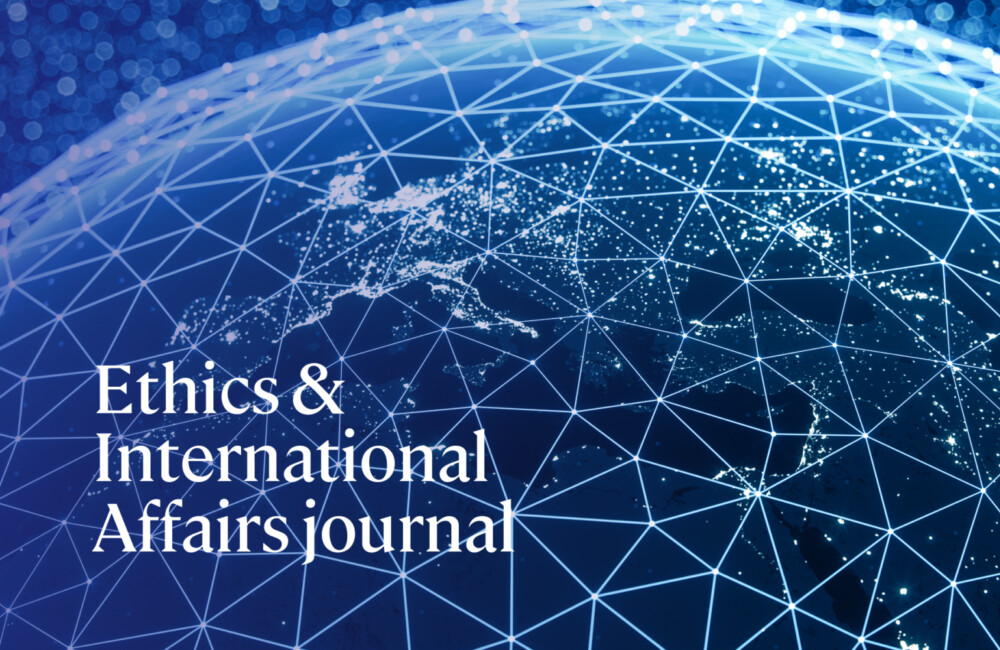ETHICS AND DEBT PROJECT (2003-2006)
The Spring 2007 issue of Ethics & International Affairs grew out of this joint project with The New School University's Graduate Program in International Affairs, with additional financial support from the Ford Foundation. The project will also produce an edited volume. Its goals were: to generate debate on the ethical questions of sovereign indebtedness; to identify the relevant principles for the ethical assessment of proposed solutions; and to explore policies and institutional arrangements based on such principles.
External Debt Nationalization a Major Tendency on Brazilian External Debt in the Twentieth Century: The Shifting Character of the State During Debt Crisis
Luiz Niemeyer, Catholic University of Sao Paulo
This paper discusses the shifting character of the Brazilian State in several major debt crises throughout this century, including its more recent that started in 1999 and is considered to have ended in 2005 when Brazil repaid in advance its debt to the IMF. The intention here is to review the role of the Brazilian State during these debt crises. (Global Policy Innovations Paper, October 2006)
The Paris Club at 50: Solution to the Debt Problem or Symbol of it?
Francesco Oddone, European Network on Debt and Development
The Paris Club celebrated its 50th anniversary in July 2006. This is a suitable opportunity for rich creditor governments to acknowledge the deeply rooted ethical shortcomings of the present international debt architecture that stand in the way of justice and development. (Ethics and Debt Project, August 2006)
Fairness in Sovereign Debt
Christian Barry, Australian National University, University College Dublin (former editor, Ethics & International Affairs) and Lydia Tomitova, Brooklyn Law School (former Carnegie Council Program Associate)
When can we say that a debt crisis has been resolved fairly? That is, what makes processes of debt restructuring, debt cancellation, or the enforcement of debt contracts more or less fair, or the outcomes of such processes better or worse? (First published in Social Research 73: 2, Summer 2006)
The Debt Threat: How Debt Is Destroying the Developing World by Noreena Hertz (HarperBusiness, 2004)
Book Review by Lydia Tomitova, Brooklyn Law School
The 2005 G-8 meeting in Gleneagles marked a major political commitment to cancel the debts that 19 poor, heavily indebted countries owed to the IMF, the World Bank, and the African Development Bank. In this review essay, Lydia Tomitova discusses The Debt Threat: How Debt Is Destroying the Developing World by Noreena Hertz. (Ethics & International Affairs, Volume 20.2 Summer 2006)
Background Papers on Ethics and Debt
Christian Barry, Australian National University, University College Dublin, and Barry Herman, The New School
"The Players and the Game of Sovereign Debt" by Barry Herman describes arrangements that guide the interactions of actors involved in this issue. Christian Barry's "Ethical Issues Relevant to Debt" discusses some of the principled disagreements underlying present disputes about sovereign debt resolution. (Ethics and Debt Project, January 2006)
Is the G8 Dealing Justly with Debt?
Lydia Tomitova, Brooklyn Law School
The offer by the finance ministers of the G8 to cancel the debts of some of the world's poorest countries is a welcome step forward in addressing the global debt problem. Yet, referring to it as 100 percent debt cancellation is misleading since the deal, despite its promise to cancel significant amounts, is far from a comprehensive solution. (Ethics and Debt Project, July 2005)
Reviving Troubled Economies
Jack Boorman, International Monetary Fund
The collapse in Argentina and the enormous cost paid by so many people in that country—as well as by the creditors of Argentina—from the massive financial and economic dislocation and disruption was not inevitable. (Ethics & International Affairs, Volume 17.2 Fall 2003)
Sovereign Debt Restructuring Proposals: A Comparative Look
Thomas I. Palley, Open Society Institute's Globalization Reform Project
Regarding the problem of sovereign borrower insolvency, two factors must be considered in this discussion: The impact on economic efficiency, in particular the price of credit for developing countries, and a regard for considerations of justice and procedural fairness. (Ethics & International Affairs, Volume 17.2 Fall 2003)
Resolving International Debt Crises Fairly
Ann Pettifor, Advocacy International Ltd
If global economic justice is to be achieved, debt crises must be assessed within the broader context of the international financial system. But this system has fostered instability and recurrent financial crises that have harmed poor countries and their people. (Ethics & International Affairs, Volume 17.2 Fall 2003)
The Constructive Role of Private Creditors
Arturo C. Porzecanski, ABN AMRO Banking Group, Columbia University
Policy-makers in Washington and other capitals of G-7 countries have been flogging the idea that the functioning of the world’s financial markets must be improved by making it easier for insolvent governments to obtain debt relief. (Ethics & International Affairs, Volume 17.2 Fall 2003)
Feasible Additional Sources of Finance for Development
This report, which is based on the conference "Feasible Additional Sources of Finance for Development," considers other sources of finance for settlement through multilateral agencies, or bilateral aid for global priorities, or as additional own resources for developing countries. (Conference Report, May 2003)
Response to "Dealing Justly with Debt"
Lex Rieffel
In response to Christian Barry's article "Dealing Justly with Debt," Rieffel offers additional points to consider when looking at Brazil's debt crisis and the "cures" put forward by the IMF. Rieffel feels that Barry's proposals might aggravate the situation, rather than alleviate it. (Inprint, February 2003)
Dealing Justly with Debt
Christian Barry, Australian National University, University College Dublin
Just a few months after Luis Inácio Lula da Silva won the Brazilian presidential elections in a landslide victory, Barry comments on Brazil's debt crisis and policies that affect debtor nations. He also remarks on the role international institutions and creditor nations can play in the situation. (Inprint, January 2003)
Strengthening Sovereign Lending Through Mechanisms for Dialogue and Debt-Crisis Workout: Issues and Proposals
Barry Herman, The New School
Herman argues that sovereign default is the culmination of an economic and financial deterioration that might have been stopped at various points but was not. The Sovereign Debt Restructuring Mechanism (SDRM) proposed by IMF is the obvious starting point for discussions of such processes, although revisions in its design seem warranted. Some are suggested here, affecting both how the mechanism would work in a defaulting country and its international implementation. (Global Policy Innovations Paper, February 2003)
From Miracle to Crisis: Brazilian Foreign Debt and the Limits of Obligation
Thomas J. Landy, SJ, College of the Holy Cross
The debt crisis of the 1980s ranks among the worst financial threats in history. This case examines the crisis from the perspective of the "limits of obligation." It explores the rights and responsibilities of the sovereign national governments involved in the crisis–especially in relation to their own domestic laws and international law. It also examines the roles of private banks and multinational institutions. (Carnegie Council Case Study Series, No. 9, 1990)
Debt and Trade: The View from Africa (1985)
Robert S. Browne, African Development Fund
This article from our archives shows that two decades ago countries within Africa were facing failing economies and looking for a continental development strategy to stem a debt crisis. Although images of Africa were dominated by famine and disease, this perception masked the reality of an economy in severe decline. Infrastructure, manufacturing, food production, and exports all experienced significant stagnation or deterioration. Browne suggests that if this situation is not addressed quickly then the consequences will plague later generations. (Worldview, Volume 28.1 January 1985)


